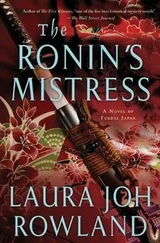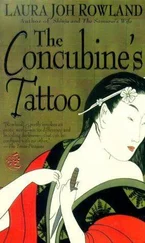Laura Rowland - The Iris Fan
Здесь есть возможность читать онлайн «Laura Rowland - The Iris Fan» весь текст электронной книги совершенно бесплатно (целиком полную версию без сокращений). В некоторых случаях можно слушать аудио, скачать через торрент в формате fb2 и присутствует краткое содержание. Год выпуска: 2014, ISBN: 2014, Издательство: St. Martin, Жанр: Исторический детектив, на английском языке. Описание произведения, (предисловие) а так же отзывы посетителей доступны на портале библиотеки ЛибКат.
- Название:The Iris Fan
- Автор:
- Издательство:St. Martin
- Жанр:
- Год:2014
- ISBN:9781466847439
- Рейтинг книги:3 / 5. Голосов: 1
-
Избранное:Добавить в избранное
- Отзывы:
-
Ваша оценка:
- 60
- 1
- 2
- 3
- 4
- 5
The Iris Fan: краткое содержание, описание и аннотация
Предлагаем к чтению аннотацию, описание, краткое содержание или предисловие (зависит от того, что написал сам автор книги «The Iris Fan»). Если вы не нашли необходимую информацию о книге — напишите в комментариях, мы постараемся отыскать её.
The Iris Fan — читать онлайн бесплатно полную книгу (весь текст) целиком
Ниже представлен текст книги, разбитый по страницам. Система сохранения места последней прочитанной страницы, позволяет с удобством читать онлайн бесплатно книгу «The Iris Fan», без необходимости каждый раз заново искать на чём Вы остановились. Поставьте закладку, и сможете в любой момент перейти на страницу, на которой закончили чтение.
Интервал:
Закладка:
But life-or-death combat made such concerns seem abstract and trivial, especially when one’s side was losing. Sano’s regiment barreled through the mass, toward the castle gate reserved for the shogun on his rare trips outside. Along the avenue, soldiers loaded cannons with gunpowder and iron balls, lit fuses, and fought off Tokugawa troops who tried to interfere. Deafened by explosions, Sano saw cannonballs fly like black comets and bombard the castle walls. Gunners fired at the towers and the guardhouse over the gate. Sparks flared in the windows of the corridors on the walls; gunshots rang out as the defenders fired down at the attackers. Men in the street, hit by bullets, went down under the fighters and horses as if sucked into a whirlpool. As Sano neared the gate, mounted Tokugawa soldiers assailed his regiment. Some of Sano’s troops took mortal strikes and died in the saddle. The Tokugawa soldiers broke through the cordon around Sano, Yanagisawa, Yoshisato, and Masahiro.
Sano lashed out his blade with all his might. To penetrate armor, one had to swing hard and hope to hit lacings instead of metal plates. His own armor slowed his movement. His steel struck steel as soldiers parried. He lashed again and his blade went through a soldier’s tunic. The soldier screamed, fell, and was gone. Yanagisawa and Yoshisato forged ahead of Sano toward the gate, where their troops were battering the ironclad planks with a ram. Masahiro and Marume were fighting other soldiers. They reached the bridge that spanned the moat. On the opposite side, the gate was open.
The invaders had breached the castle.
Arrows rained onto Sano and his comrades. Bullets pinged off them. Each one that hit Sano felt like a punch. For hundreds of years, samurai fathers and sons had fought together in battles, but no other father could have feared for his son more than Sano did for Masahiro as they rode into a seething crush of foot soldiers at the gate. Beyond it, battling troops crowded the passage.
“Dismount!” Sano yelled as he jumped off his horse.
Masahiro, Marume, Yanagisawa, Yoshisato, and the troops from what was left of their regiment-some twenty men-followed suit. Without horses, they could maneuver more easily and quickly. Their troops cleared a narrow path through the crush. Sano and Masahiro were through the gate. Ahead, within the uphill passage, Yanagisawa’s advance troops fought the Tokugawa army. Archers and gunners in the corridor and towers above fired down. It was like shooting fish in a trough. Arrows and bullets hit defenders as well as invaders. Yanagisawa’s gunners and archers fired back, but the rain-soaked passage filled with dead bodies; the gray, noxious haze of gunpowder smoke; and the storm of missiles.
The only way to Lord Ienobu-and Reiko and Akiko-was through it.
* * *
Reiko and Akiko ran through the Large Interior. The passages were deserted, the rooms empty. The chanting grew louder as they approached the main palace. Reiko heard booms in the distance-gunfire. The war had started. Yanagisawa’s forces would soon invade the castle. She thought of Sano and Masahiro, and she felt a sudden longing for her husband.
They’d parted on bad terms. She hadn’t even said good-bye to him. What if he should die before she saw him again?
This was no time for such thoughts. Reiko clung to her hope that exposing Lady Nobuko would somehow save the day. She kept moving. The building resonated with chants, a giant beehive with an ailing monarch at its heart. Drums kept rhythm. Incense smoke breathed through the passages. Reiko cautiously opened the heavy door decorated with carved flowers and found herself face-to-face with a guard who stood on the other side.
He was an older man she knew from when she’d lived in the castle. He frowned as he recognized her. “You’re Sano- san ’s wife. You’re not supposed to be here.”
In an instinctive, single motion, Reiko drew the dagger from under her sleeve and lashed out with the blade as she said to Akiko, “Don’t scream!”
The guard staggered, clutching his gashed throat. Blood spurted between his fingers. Reiko pulled Akiko backward, away from the spraying blood as he fell dead across the threshold. Eyes wide with horror, Akiko clapped her hands over her mouth. Reiko felt a terrible, sickening guilt. A child should never have to see her mother kill. But a cold, matter-of-fact voice spoke from within Reiko’s warrior spirit: Akiko was born into this family. For us it’s too often a choice between killing or being killed. She’d better get used to it.
“We have to go,” Reiko said.
They stepped over the dead guard, holding their skirts up out of his blood, and rushed through the palace. The chanting, drumming, and booms covered the sound of their footsteps. The last corridor was jammed with people. Gripping Akiko’s hand, Reiko plunged into the crowd. Servants fingered wooden rosary beads while they prayed. Reiko and Akiko pushed past them, jostled them, stepped on their feet. Murmurs arose: “Isn’t that Reiko and her daughter? How did they get in here?”
Wishing she weren’t so notorious, Reiko kept going; she dragged Akiko behind her. She was drenched with sweat from the heat of the packed bodies and her own anxiety. They turned a corner. The crowd here was all officials down the middle of the passage and guards along the walls. Reiko’s heart sank. The men heard the stir and turned.
Reiko and Akiko found themselves standing alone, conspicuous. The crowd had drawn back from the trespassers. Hostile faces stared at them. Akiko’s fingernails dug into Reiko’s hand. Reiko glanced over her shoulder. People craning their necks to see what was happening blocked her way out of the palace. Her fate and her daughter’s hinged precariously on this moment.
“I have to speak to the shogun.” Her voice was small, frightened. The chanting in the corridor stopped; people quieted down to listen. Fainter chanting and drumming came from the shogun’s chamber. The officials glared, confused and indignant. Guards advanced on her and Akiko. She’d gambled their lives for this instant. Quaking inside, she gulped. “It was Lady Nobuko who-”
Loud booms interrupted. From the outer section of the palace men’s voices yelled, “The castle is under attack!”
Terror sucked the breath out of Reiko. Yanagisawa’s army was here; her husband and son were with it. She and Akiko were caught in the middle of the attack. Thuds rocked the palace. The corridor became a turmoil of screams and pushing as guards charged through the crowd, toward the battle, past Reiko and Akiko. Two trespassers were a minor nuisance compared to an invasion. Reiko and Akiko fought their way against the tide. A chain-mailed elbow struck Reiko on the cheek. Feet stomped hers. Akiko’s hand was yanked from her grasp.
“Mama!” Akiko shrilled above the screams.
Reiko turned and saw Akiko fall beneath the mob. Akiko screamed as guards trampled her. Reiko threw herself at them, kicked, pummeled, and shoved. She pulled Akiko up, but men knocked them over. They crawled through a thrashing forest of armored legs and black silk robes. Someone kicked Reiko’s chin. Her ears rang. She and Akiko crawled free of the mob to the shogun’s bedchamber. Guards stood against the lattice-and-paper walls, flanking the door, ready to defend the shogun from the enemy. They didn’t notice Reiko and Akiko, crawling below their line of sight, until Reiko lunged at the door and yanked it open.
“Hey! You can’t go in there!”
She couldn’t think about what might happen to her and Akiko. She didn’t know what to do but finish what she’d started. They stumbled on their knees across the threshold. The chamber was hazy with incense smoke billowing from burners in the alcove. In a flash of mental clarity heightened by terror, Reiko absorbed the scene during the moment before the guards caught up with her and anyone else noticed her and Akiko. Lord Ienobu and a physician knelt on one side of the shogun’s bed, three priests beating drums on the other. At its end, Lady Nobuko, her head bandaged, knelt beside the lady-in-waiting whose mouth resembled a pickled plum. Many guards stood against the walls. The shogun looked like a corpse, with his eyes closed, his face waxen. Except for the priests, whose lips moved and hands drummed as they chanted prayers, everyone was as still as the shogun. Chins raised, their expressions taut with fear, they listened to the sounds of war coming.
Читать дальшеИнтервал:
Закладка:
Похожие книги на «The Iris Fan»
Представляем Вашему вниманию похожие книги на «The Iris Fan» списком для выбора. Мы отобрали схожую по названию и смыслу литературу в надежде предоставить читателям больше вариантов отыскать новые, интересные, ещё непрочитанные произведения.
Обсуждение, отзывы о книге «The Iris Fan» и просто собственные мнения читателей. Оставьте ваши комментарии, напишите, что Вы думаете о произведении, его смысле или главных героях. Укажите что конкретно понравилось, а что нет, и почему Вы так считаете.












